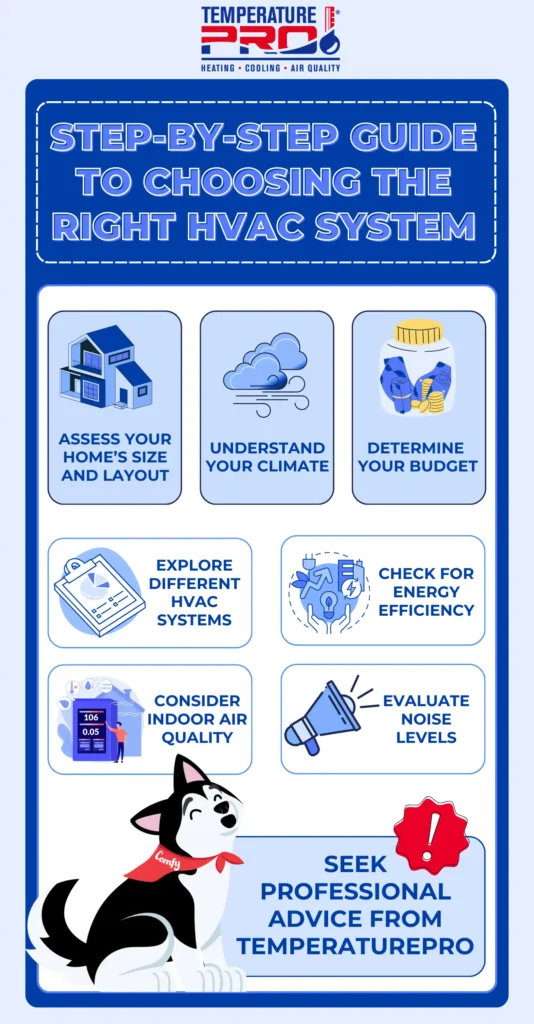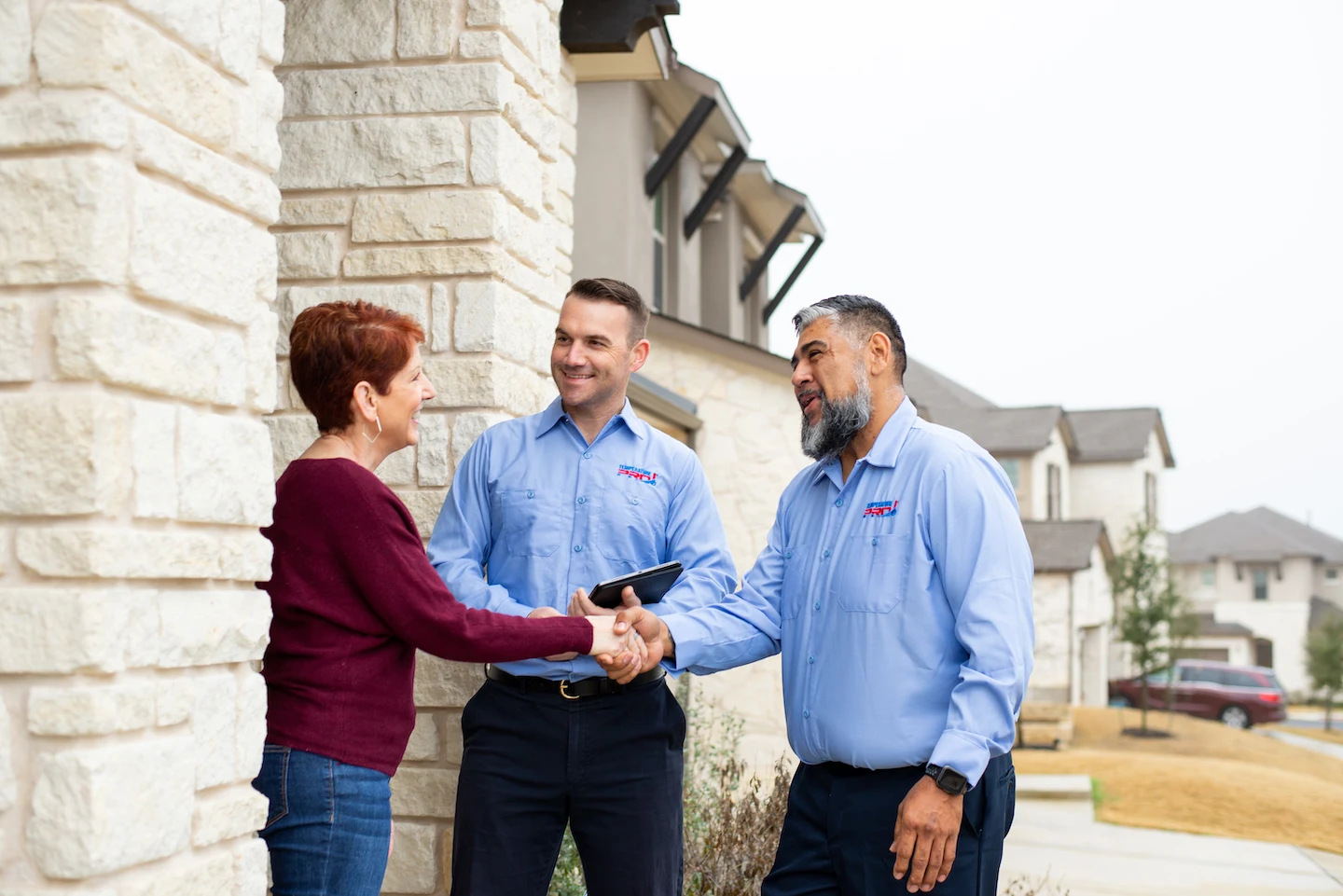Choosing the right HVAC (Heating, Ventilation, and Air Conditioning) system for your home can be a daunting task. With numerous options available in the market, it’s essential to understand the key factors that will help you make the best decision. This comprehensive guide will walk you through a step-by-step process, answer frequently asked questions, and share expert tips to ensure you select the most suitable HVAC system for your home.
Step-by-Step Guide to Choosing the Right HVAC System

1. Assess Your Home’s Size and Layout
The size of your home significantly impacts the type and size of the HVAC system you need. Here are some key considerations:
- Square Footage: Larger homes require more powerful systems. An undersized unit will struggle to maintain a comfortable temperature, while an oversized unit will cycle on and off too frequently, reducing efficiency.
- Layout: The number of rooms, floors, and the overall layout of your home can affect airflow and temperature distribution. For example, multi-story homes might benefit from zoned HVAC systems that allow for different temperatures on each floor.
Pro-Tech Tip: TemperaturePro Professionals have the proper technology to do an accurate load calculation for your home. A common misconception is the “X amount of square footage = 1 ton”: this calculation does not provide an accurate estimation of the required size for your home. We have the right tools as well as the expertise to get the accurate size and cost of a system that is the perfect fit for your home.
2. Understand Your Climate
Your local climate plays a crucial role in determining the best HVAC system for your home. Consider the following:
- Hot Climates: In areas with hot summers, an efficient air conditioning system is vital. Look for units with high SEER (Seasonal Energy Efficiency Ratio) ratings.
- Cold Climates: In colder regions, heating is the priority. High-efficiency furnaces or heat pumps designed for low temperatures are ideal.
- Mixed Climates: For areas with both hot summers and cold winters, a versatile system like a heat pump that provides both heating and cooling might be the best choice.
Pro-Tech TemperaturePro Tip: We wrote an entire blog on this subject alone, with visuals! Read our post to get a better understanding of different HVAC systems and which climates they work best in. Plus, your local TemperaturePro Tech will create a custom quote for you that includes all of these considerations and more.
3. Determine Your Budget
HVAC systems are a significant investment. Especially in recent years, there has been a significant price increase for all HVAC equipment. Systems now cost substantially more than previous years for replacements. It’s essential to balance upfront costs with long-term savings:
- Initial Costs: This includes the cost of the HVAC unit and installation. More efficient systems may have higher upfront costs but lower operating expenses.
- Operating Costs: Consider the energy efficiency of the system. High-efficiency units often have higher initial costs but can save you money on utility bills over time.
- Maintenance and Repairs: Regular maintenance is crucial for the longevity of your HVAC system. Some systems may require more frequent maintenance than others.
4. Explore Different Types of HVAC Systems
There are several types of HVAC systems, each with its own set of advantages and disadvantages:
- Central Air Conditioning Systems: These are ideal for cooling large homes. They use a network of ducts to distribute cool air.
- Heat Pumps: Versatile systems that provide both heating and cooling. They are highly efficient, especially in moderate climates.
- Furnaces: Best for heating in colder climates. They can be powered by gas, electricity, or oil.
- Ductless Mini-Split Systems: These systems are ideal for homes without existing ductwork. They provide both heating and cooling and are highly efficient.
- Boilers: Used for heating, boilers distribute heat through hot water radiators or radiant floor systems. They are more common in colder climates.
5. Check for Energy Efficiency
Energy efficiency is a crucial factor in choosing an HVAC system. Your local TemperaturePro Technicians will be able to explain in detail the difference between the energy efficiency in systems and create a custom solution for you. For a quick reference:
- SEER Rating: For air conditioners, look for a high SEER rating. The higher the SEER, the more efficient the unit.
- AFUE Rating: For furnaces, check the AFUE (Annual Fuel Utilization Efficiency) rating. Higher AFUE ratings indicate better efficiency.
- HSPF Rating: For heat pumps, the HSPF (Heating Seasonal Performance Factor) rating is important. Higher HSPF ratings mean better heating efficiency.
- ENERGY STAR Certification: Look for HVAC systems that are ENERGY STAR certified, which ensures they meet strict energy efficiency guidelines set by the EPA.
Pro-Tech Tip: Ask your local TemperaturePro Tech if they have a location-based energy savings calculator. Our techs will go over different replacement options for you as well as the pros and cons of each, including higher energy efficient systems.
6. Consider Indoor Air Quality
Your HVAC system plays a significant role in maintaining indoor air quality. Features to look for include:
- Air Filters: High-quality air filters can remove allergens, dust, and other pollutants from the air.
- Humidity Control: Some HVAC systems include dehumidifiers or humidifiers to maintain optimal indoor humidity levels.
- Ventilation: Proper ventilation is essential for fresh air circulation and removing indoor pollutants.
7. Evaluate Noise Levels
HVAC systems can vary in noise levels. Consider the following:
- Decibel Ratings: Check the decibel ratings of the units. Lower decibel ratings mean quieter operation.
- Placement: The location of the HVAC unit can affect noise levels. Outdoor units should be placed away from windows and living areas to minimize noise disturbance.
8. Seek Professional Advice
Consulting with A TemperaturePro HVAC professional can provide valuable insights tailored to your specific needs:
- Home Evaluation: Your local TemperaturePro Technicians can conduct a thorough evaluation of your home and recommend the best HVAC system.
- Load Calculation: Accurate load calculations ensure the system is appropriately sized for your home.
- Installation: Professional installation ensures the system operates efficiently and reliably.
Frequently Asked Questions About HVAC Systems
1. What Size HVAC System Do I Need?
The size of the HVAC system depends on the square footage of your home and other factors like insulation, windows, and climate. We can perform a load calculation to determine the appropriate size for your home – find your local TemperaturePro here.
2. How Often Should I Replace My HVAC System?
On average, HVAC systems last 10-15 years. However, this can vary depending on the type of system, maintenance, and usage. Regular maintenance can extend the lifespan of your system.
3. What Are the Benefits of a High-Efficiency HVAC System?
High-efficiency systems can significantly reduce energy bills, provide better temperature control, and have a lower environmental impact. They often come with advanced features like programmable thermostats and variable speed motors.
4. How Can I Improve My HVAC System’s Efficiency?
Regular maintenance, such as changing air filters, cleaning coils, and ensuring proper insulation, can improve your system’s efficiency. Additionally, upgrading to a programmable thermostat and sealing ductwork can enhance efficiency.
We developed a membership program that provides benefits such as priority scheduling, reminders about when to schedule your routine maintenance, discounts on parts and labor, and no overtime fees. Read more on our ProPlan membership here.
5. What Is a SEER Rating?
SEER stands for Seasonal Energy Efficiency Ratio. It measures the cooling efficiency of air conditioners and heat pumps. Higher SEER ratings indicate better energy efficiency.
6. How Important Is HVAC Maintenance?
Regular HVAC maintenance is crucial for optimal performance and longevity. It helps prevent breakdowns, improves efficiency, and ensures your system operates safely.
7. Can I Install an HVAC System Myself?
HVAC installation is complex and should be performed by a licensed professional. Improper installation can lead to reduced efficiency, increased energy bills, and safety hazards. For more info, give us a call.
8. What Is Zoning in HVAC?
Zoning allows you to control temperatures in different areas (zones) of your home independently. It enhances comfort and can lead to energy savings by heating or cooling only occupied areas.
Choosing The Right HVAC System with TemperaturePro
Choosing the right heating or cooling system for your home can seem like a daunting task, considering everything mentioned above. However, you are in good hands when you choose the Pros at TemperaturePro to help you make this important investment decision. Let’s get you started today – find your local TemperaturePro and let’s move forward together for your home.






